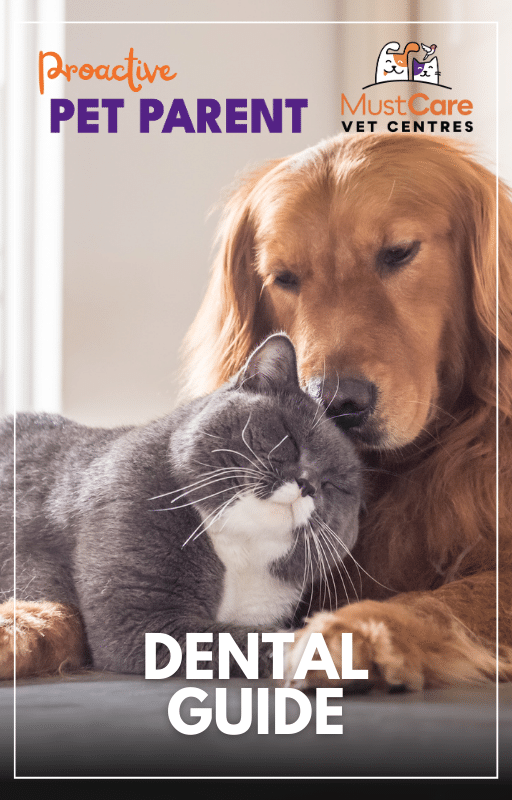Share This Blog With Other Pet Parents!
Managing the Annual Cost of Cat Ownership: Importance of Preventative Care
As cat owners, we adore our furry companions, but we can’t ignore the financial responsibilities that come with their care. Have you ever wondered about the true cost of keeping a cat by your side? From food and litter to vet visits and unexpected emergencies, the annual expenses can add up quickly.
This article aims to shed light on the practical aspects of cat ownership costs and how preventative care plays a pivotal role in managing these expenses. By delving into the intricacies of budgeting and emphasising the importance of proactive healthcare measures, we’ll navigate through the maze of cat care expenses, helping you to provide the best for your furry companion while maintaining financial peace of mind.
What you’ll learn from this blog:

For all you need to know, download our
FREE Dental Guide
This blog is part of our Proactive Pet Parent series! This is just the beginning… To see more blogs, click here! Better yet, sign-up to our newsletter to receive these directly to your inbox each month.
Sign-up To The Proactive Pet Parent Newsletter
The Benefits of Preventative Care
Investing in preventative care for your cat offers numerous benefits that extend beyond just financial savings. By prioritising your cat’s health and well-being through regular check-ups and vaccinations, you can detect and address potential health issues early, before they escalate into more serious problems. This proactive approach not only helps ensure your cat’s longevity and quality of life but also saves you money on expensive treatments down the line.
Additionally, preventative measures such as parasite prevention and dental care contribute to your cat’s overall health and comfort, reducing the risk of future health issues that may require costly interventions. Regular veterinary visits provide an opportunity for your veterinarian to offer personalised advice and recommendations tailored to your cat’s specific needs, further enhancing their overall health and well-being.
Ultimately, prioritising preventative care for your cat is a win-win scenario, allowing you to provide them with the best possible care while also saving money on potential healthcare expenses.
Breakdown of Annual Cat Ownership Expenses
Now, we’ll go through the annual expenses associated with cat ownership. These include:
- Food is undoubtedly one of the most significant recurring costs. Whether you opt for premium brands or more budget-friendly options, ensuring your cat receives a balanced and nutritious diet is paramount.
- Alongside food, there’s the ongoing expense of litter, a necessity for maintaining your cat’s hygiene and comfort.
- Grooming supplies, such as brushes and nail clippers, also factor into the equation, albeit on a smaller scale.
- Additionally, there are essential healthcare expenses to consider, such as routine veterinary check-ups and vaccinations. These preventive measures not only promote your cat’s overall health but also help identify potential issues early on, potentially saving you money in the long run.
- However, it’s crucial to be prepared for unexpected medical expenses, including emergency vet visits and treatments.
While these costs can be daunting, having a financial plan in place can alleviate some of the stress associated with unexpected expenses. By understanding and budgeting for these various expenses, you can ensure that your cat receives the care they need while maintaining financial stability.
Budgeting Tips for Cat Owners
When it comes to managing your cat’s expenses, budgeting is key. Start by creating a dedicated budget specifically for your pet-related expenses, including essentials like:
- Food, litter, and routine veterinary care. Set aside a portion of your budget for unexpected expenses, such as emergency vet visits or unexpected treatments, to avoid financial strain in times of crisis.
- Consider buying pet supplies in bulk or opting for generic medications when possible. Take advantage of discounts and promotions offered by pet supply stores and veterinary clinics to stretch your budget further.
- Another helpful tip is to prioritise spending on essentials like quality food and preventive healthcare while being mindful of discretionary expenses.
By following these budgeting tips, you can ensure that your cat receives the care they need without putting a strain on your finances.
Importance of Health Insurance for Cats
Considering the potential costs associated with veterinary care, investing in health insurance for your cat can provide invaluable peace of mind. Just like humans, cats can experience unexpected health issues or accidents that require medical attention, which can quickly accumulate significant expenses.
Health insurance can help offset these costs, ensuring that you can provide your cat with the necessary care without worrying about financial constraints. With a comprehensive health insurance policy in place, you can rest assured that your cat will have access to the medical treatment they need, when they need it, without hesitation.
Additionally, some insurance plans may offer coverage for preventative care, such as vaccinations and routine check-ups, further promoting your cat’s overall health and well-being. While health insurance premiums may represent an additional expense, the potential savings in veterinary bills in the event of an emergency or illness far outweigh the cost.
Ultimately, investing in health insurance for your cat is a proactive step towards ensuring their health and longevity, while also protecting your financial stability. By prioritising your cat’s health through insurance coverage, you can enjoy peace of mind knowing that you’re prepared for whatever health challenges may arise.
Building a Strong Relationship with Your Veterinarian
Developing a strong relationship with your veterinarian is essential for providing the best possible care for your cat. Regular veterinary check-ups allow your veterinarian to monitor your cat’s health and detect any potential issues early on. This proactive approach not only helps ensure your cat’s well-being but also strengthens the bond between you and your veterinarian.
Your veterinarian can offer personalised advice and recommendations tailored to your cat’s specific needs, helping you make informed decisions about their care. Moreover, building a strong relationship with your veterinarian can provide peace of mind knowing that you have a trusted partner in your cat’s healthcare journey.
Understanding the annual costs of cat ownership and the importance of preventative care can significantly impact both your feline friend’s well-being and your financial stability. By breaking down the various expenses associated with cat ownership, from food and litter to veterinary care, we’ve shed light on the financial responsibilities that come with providing a loving home for your cat.
We’ve emphasised the value of investing in preventative healthcare, and health insurance to ensure that your cat receives the best possible care throughout their life. We encourage you to continue prioritising your cat’s health and well-being. By staying informed and proactive about their care, you can enjoy a fulfilling and rewarding relationship with your feline companion for years to come.
As always if you have any questions for the veterinary team at MustCare, please get in touch today.


